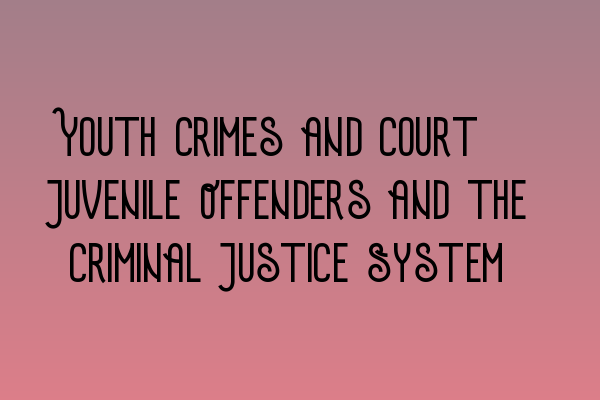Youth Crimes and Court: Juvenile Offenders and the Criminal Justice System
Youth crimes and court proceedings involving juvenile offenders can be complex and require a thorough understanding of the criminal justice system. In this article, we will explore the various aspects of youth crimes and the court process that young individuals may face when accused of criminal offenses.
Before delving into the specifics, it is worth mentioning that the SQE Criminal Law & Practice Law UK provides essential study materials for aspiring solicitors to prepare for the Solicitors Qualifying Examination (SQE). If you are interested in becoming a solicitor, make sure to check out their SQE Exam Prep: Essential Study Materials for Aspiring Solicitors.
Juvenile Offenders: Who Are They?
Juvenile offenders are individuals who have committed a crime while under the age of 18. They are subject to a separate set of laws and procedures compared to adult offenders due to their age and developmental considerations. The criminal justice system recognizes that juveniles may still be in the process of maturing and aims to provide them with rehabilitation and support rather than solely punitive measures.
To learn more about the Solicitors Qualifying Examination (SQE) format and its requirements, you can read our article on Demystifying the Solicitors Qualifying Examination Format.
The Role of the Youth Court
When a juvenile offender is charged with a crime, their case is typically heard in a youth court. The youth court is a specialized court specifically designed to handle cases involving young individuals. It aims to ensure fair treatment, taking into consideration the unique circumstances surrounding youth crimes.
International lawyers who are interested in taking the SQE Exam can find valuable insights and success strategies in our article on SQE Exam for International Lawyers: Challenges and Success Strategies.
Legal Rights of Juvenile Offenders
Just like adult offenders, juvenile offenders have legal rights that must be protected throughout the court process. These rights include the right to legal representation, the right to remain silent, and the right to a fair trial. It is crucial for juvenile offenders and their families to understand these rights to ensure they are properly exercised and upheld.
The Sentencing Process
When a juvenile offender is found guilty, the court will determine an appropriate sentence based on the severity of the offense, the offender’s background, and other relevant factors. The aim of sentencing in youth court is to promote rehabilitation and reintegration into society. Sentences can range from community service and probation to rehabilitation programs and, in extreme cases, limited periods of detention.
For UK entrepreneurs considering setting up an LLC, we have comprehensive step-by-step guides that walk you through the process. You can check out our articles on LLC Formation Made Simple: Step-by-Step Guide for UK Entrepreneurs and LLC Formation: A Step-by-Step Guide for UK Entrepreneurs for all the information you need.
The Importance of Rehabilitation
One of the key principles in dealing with juvenile offenders is the focus on rehabilitation rather than punishment. The criminal justice system recognizes that young individuals have the capacity for change and aims to provide them with the necessary support and interventions to prevent further criminal behavior. Rehabilitation programs often include counseling, education, and skill-building activities to help young offenders reintegrate into society successfully.
In conclusion, youth crimes and court proceedings involving juvenile offenders require a sensitive and specialized approach. The criminal justice system acknowledges the unique circumstances of young individuals and aims to provide rehabilitation and support to promote their successful reintegration into society. It is essential for aspiring solicitors to have a deep understanding of this area of law, and the SQE Criminal Law & Practice Law UK offers valuable study materials to aid in their preparation for the SQE Exam. For more information on these study materials, make sure to visit the SQE Exam Prep: Essential Study Materials for Aspiring Solicitors section of their website.
